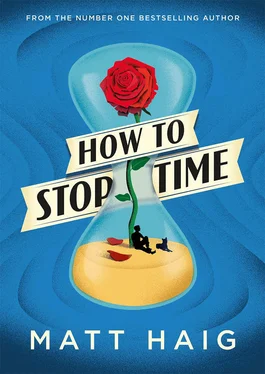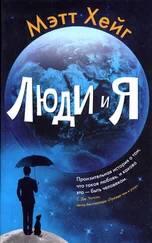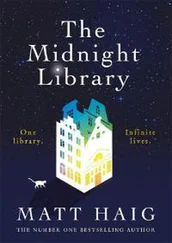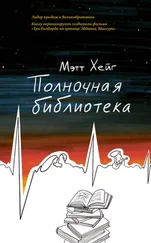Мэтт Хейг - How to Stop Time
Здесь есть возможность читать онлайн «Мэтт Хейг - How to Stop Time» весь текст электронной книги совершенно бесплатно (целиком полную версию без сокращений). В некоторых случаях можно слушать аудио, скачать через торрент в формате fb2 и присутствует краткое содержание. Год выпуска: 2017, Издательство: Canongate Books, Жанр: Современная проза, на английском языке. Описание произведения, (предисловие) а так же отзывы посетителей доступны на портале библиотеки ЛибКат.
- Название:How to Stop Time
- Автор:
- Издательство:Canongate Books
- Жанр:
- Год:2017
- ISBN:нет данных
- Рейтинг книги:4 / 5. Голосов: 2
-
Избранное:Добавить в избранное
- Отзывы:
-
Ваша оценка:
- 80
- 1
- 2
- 3
- 4
- 5
How to Stop Time: краткое содержание, описание и аннотация
Предлагаем к чтению аннотацию, описание, краткое содержание или предисловие (зависит от того, что написал сам автор книги «How to Stop Time»). Если вы не нашли необходимую информацию о книге — напишите в комментариях, мы постараемся отыскать её.
How to Stop Time — читать онлайн бесплатно полную книгу (весь текст) целиком
Ниже представлен текст книги, разбитый по страницам. Система сохранения места последней прочитанной страницы, позволяет с удобством читать онлайн бесплатно книгу «How to Stop Time», без необходимости каждый раз заново искать на чём Вы остановились. Поставьте закладку, и сможете в любой момент перейти на страницу, на которой закончили чтение.
Интервал:
Закладка:
‘I call you when I want to call you. And you answer. Or I will get worried. And you know that you don’t want me to get anxious, because then I will have to do something. So, just remember your place. Remember how much the society has helped you. Okay, we’d have liked to have found your daughter. But remember everything else. Remember that before eighteen ninety-one you were lost. You had no freedom. You had no choice. You were just a confused grief-stricken man, who had no idea who he was. I gave you a map. I helped you find yourself.’
I still haven’t found myself , I don’t say. I’m nowhere near .
‘Remember eighteen ninety-one, Tom. Keep it in mind.’
And when the phone call ends, I do what he instructs. As I click off Camille’s photo I think back to 1891, I think of that moment when my life stopped being one thing and started being another, and I try to understand it. I try to work out if I sailed into a trap or into freedom, or if, maybe, it could have been both at once.
I
Like
The way
That when you
Tilt
Poems
On their side
They
Look like
Miniature
Cities
From
A long way
Away.
Skyscrapers
Made out
Of
Words.
I want you to
Slow down
I just want it all
To slow down;
I want to make a forest
Of a moment
And live in that forest
For ever
Before you go.
St Albans, England, 1891
Jeremiah Cartwright had read the sky and declared, with a dark seriousness, that it was going to rain later and that he must go for iron while it was still dry. He wouldn’t be back for another hour. I was alone, by the forge, watching the metal as it glowed red, then orange. Yes, as in life, strike while the iron is hot, but not just any heat. You had to wait until the orange was starting to brighten, become that raw bright pink-yellow-orange. This was forging heat . The heat of change. The yellow quickly became white and as soon as it was white hot it was all over, so you had to watch and grab the moment before it was too late.
It was only when I took the metal and placed it over the anvil to begin to strike it that I realised someone was standing there.
A woman. A peculiar-looking woman.
I can still picture her, vividly, the way I first saw her. She looked about forty years old.
She was dressed in a long skirt and blouse, both black, and her face was shaded by a broad-brimmed hat. An outfit far too hot for the late June day, let alone for the hellish temperature of the forge. It took me a second, because of the shading over her face, to realise that she was wearing a jet-black silk eye patch over her left eye.
‘Hello there. How can I help you?’
‘You will find it is the other way around.’
‘What do you mean?’
She shook her head. She was wincing a little from the heat of the place. ‘No questions. Not just yet. Your curiosity shall be satisfied, I assure you. You must come with me.’
‘What?’
‘You can’t stay here.’
‘What?’
‘I said: no questions.’
The next thing I knew she was pointing a small wooden pistol straight at my chest.
‘Blazing fuck. What are you doing?’
‘You have outed yourself to the scientific community. There is an institute . . . I haven’t got time to explain this. But, if you stay here, you will be killed.’
The heat of the forge often made being in there a kind of delirium, a fever dream. For a moment, I thought this was a waking dream.
‘Dr Hutchinson is dead,’ she said. Her voice was composed, but there was a quiet force to it, as if not just stating a fact but an inevitable one.
‘Dr Hutchinson?’
‘Murdered.’
She let the word stay in the air, with nothing but the sound of the roaring fire for company.
‘Murdered? Who by?’
She handed me a news item that had been cut out of The Times .
Doctor’s Body Found in Thames .
I skimmed the piece.
‘You made a mistake. You should never have gone to see him about your condition. He had written a paper on you. On the condition. He had given it a name. Anageria. The paper would have, very possibly, been published. And that wouldn’t do. Not at all. So, I am afraid the society had no other recourse. He had to die.’
‘You killed him?’
Her face now shone from the heat. ‘Yes, I killed him, to save lives. Now, come with me. There is a coach waiting outside. It is ready to take us to Plymouth.’
‘Plymouth?’
‘Don’t worry, it is not to reminisce.’
‘I don’t understand. Who are you?’
‘My name is Agnes.’
She opened up her handbag and pulled out an envelope. She handed it to me. I put down the mallet and took it. It had no name, no address, but its blue paper bulged with contents.
‘What is this?’
‘It’s your ticket. And your identity papers.’
I was thrown. ‘What?’
‘You have lived long. You have a good survival instinct. But you have to leave now. You must come with me. There is a coach waiting. From Plymouth we head to America. You will find every answer you have ever wanted.’
And she walked out without another word.
Atlantic Ocean, 1891
Boats had changed.
I had been to sea before, but being at sea no longer felt like being at sea.
The progress of humanity seemed to be measured in the distance we placed between ourselves and nature. We could now be in the middle of the Atlantic, on a steam ship such as the Etruria , and feel as if we were sitting in a restaurant in Mayfair.
We were in first class. First class in those days really was first class, and you had to keep up appearances.
The woman, Agnes, had provided me with a suitcase full of new clothes and I was wearing an elegant cotton twill three-piece with a silk ascot tie. I was clean shaven. She had shaved me, with a razor blade, and as she did so I seriously contemplated the possibility that she was going to cut my throat.
From the restaurant window, we could see the lower decks, where crowds of people in second class and steerage were walking around in shabbier attire, the clothes I had been wearing last week, or were leaning against the rail and looking out to the horizon, with nothing but Ellis Island and American dreams awaiting them.
Of everyone I have ever met, I would say Agnes was the most difficult to put into words. She was an extremely rare concoction of forthright character, amoral habits and restrained manners. Oh, and she had the capacity for murder.
She was still in mourning black, Queen Victoria-style, and looked every part the upper-class lady. Even the eye patch seemed to have an elegance about it. Though her choice of drink – whisky – seemed a little eccentric.
Her name – her present name – was Gillian Shields. But she had been born Agnes Wade.
‘Think of me as Agnes. I am Agnes Wade. Never use that name again but think of it always. Agnes Wade.’
‘And think of me as Tom Hazard.’
She was born in York in 1407. She was older than me by more than a century. This managed both to trouble and to comfort me. I hadn’t yet got to hear about all of her various identities over the years, but she revealed that in the mid-eighteenth century she had been Flora Burn, the famous pirate who had operated off the coast of America.
She had just ordered the chicken fricassee and I had ordered the broiled bluefish.
‘Is there a woman in your life?’
I hesitated before answering, and she felt the abrupt need to qualify her question. ‘Don’t worry. I have no interest in you in that regard. You are too serious. I enjoy serious women, but prefer – when I partake – for a man to be as light as day. It was curiosity. There must have been someone. You can’t live as long as you have lived without there being someone.’
Читать дальшеИнтервал:
Закладка:
Похожие книги на «How to Stop Time»
Представляем Вашему вниманию похожие книги на «How to Stop Time» списком для выбора. Мы отобрали схожую по названию и смыслу литературу в надежде предоставить читателям больше вариантов отыскать новые, интересные, ещё непрочитанные произведения.
Обсуждение, отзывы о книге «How to Stop Time» и просто собственные мнения читателей. Оставьте ваши комментарии, напишите, что Вы думаете о произведении, его смысле или главных героях. Укажите что конкретно понравилось, а что нет, и почему Вы так считаете.

![Мэтт Хейг - Влюбиться в жизнь [Как научиться жить снова, когда ты почти уничтожен депрессией]](/books/28868/mett-hejg-vlyubitsya-v-zhizn-kak-nauchitsya-zhit-sn-thumb.webp)





![Мэтт Хейг - Полночная библиотека [litres]](/books/388474/mett-hejg-polnochnaya-biblioteka-litres-thumb.webp)

![Мэтт Хейг - Клуб призрачных отцов [litres]](/books/392121/mett-hejg-klub-prizrachnyh-otcov-litres-thumb.webp)

![Мэтт Хейг - Отец Рождество и Я [litres]](/books/421076/mett-hejg-otec-rozhdestvo-i-ya-litres-thumb.webp)
